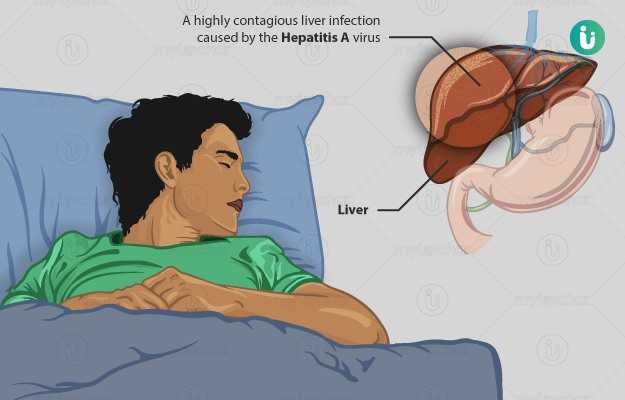What is Hepatitis A?
Hepatitis A is a viral infection that causes swelling of liver. It is commonly seen in children below 5 years of age and does not show any symptoms. However, the severity of the disease increases with age. Typically, the infection stays only for a short period of time and rarely results in death.
What are its main signs and symptoms?
Symptoms of infection start to appear within 2-4 weeks of exposure to the virus. Commonly seen symptoms are:
- Yellow coloured urine
- Yellow discolouration of the white part of eyes
- Fever
- Weakness
- Loose stools
- Nausea
- Reduced Appetite (Read more: Loss of appetite causes)
- Joint pain
Rarely, it affects the liver severely and causes failure. (Read more: Liver failure symptoms)
What are its main causes?
Hepatitis infection is caused by a virus called hepatitis A Virus (HAV). It is mainly spread through the intake of food and water infected with stools containing the virus.
Infection can spread from one person to another by:
- Consumption of food prepared by an ill person
- Drinking water which is not purified
- Personal contact with an infected person like through sex or personal care products
You cannot get infected through cough, touch, hug or breastfeeding.
How is it diagnosed and treated?
Your doctor will diagnose a hepatitis A infection on the basis of symptoms you experience, a physical examination and blood tests. Blood tests will identify antibodies produced by the body to fight against the hepatitis A virus. There is no fixed treatment for hepatitis A infection, only the symptoms are treated based on their severity. General treatment includes proper rest and drinking plenty of purified water to compensate for fluid loss through diarrhoea and vomiting.
Recovery will be seen within a few weeks of infection. Usually, hospitalization is recommended only if there is liver failure.
You can protect yourself from getting affected by:
- Drinking purified water
- Consuming properly cleaned and cooked food
- Avoid taking fruits and vegetables without peeling the skin
- Avoiding sharing of needles
- Avoiding sex with an infected person (Read more: Safe sex practices)
- Taking vaccination for hepatitis A virus right in the childhood

 Doctors for Hepatitis A
Doctors for Hepatitis A  OTC Medicines for Hepatitis A
OTC Medicines for Hepatitis A
 Hepatitis A articles
Hepatitis A articles

 Diet for Hepatitis A
Diet for Hepatitis A







 Editorial Team
Editorial Team

 Dt. Akanksha Mishra
Dt. Akanksha Mishra











